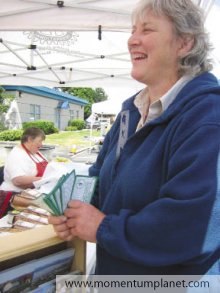
paula luther , RHN
published in The Stirring Stick, December 2008
As the season shifts and we move into the cool winter slumber, our energies are also drawn inward, and we are given the opportunity to reflect on the passing season, and create the diversity and abundance of what lays ahead. In our ever increasingly busy and focused world, it is refreshing to take the time to reflect upon the interconnectedness of all of the elements that come together to create success, understanding that it is this unique and powerful meeting that creates a unique and dynamic outcome.
Biodynamic farming intimately understands the principles & importance of interconnectedness like no other. Just as these principles cultivate a diverse and rich crop, so too can they cultivate a diverse and rich community. This is integral to the foundation of the BC Farmers' Market Nutrition & Coupon Project (FMNCP), which brings together local farmers, farmers' markets, low-income families with children, pregnant women, cooking and skill building programs, and government. All of these elements work together for low-income families with children to have access to local, nutritious foods. So that we may all eat local, nutritious foods.
This BC Association of Farmers' Markets initiative is the first of its kind in Canada. Funded by the Province of BC, this innovative project provides $15 per week in coupons to low-income families that are used to purchase fresh fruits, vegetables, meats, eggs, dairy or fresh cut herbs at participating farmers’ markets for 17 weeks during regular market season (June-October). 2008 season saw 10 communities around the province participating. Participating communities included; Prince George, Smithers, Kelowna, Kamloops, Coquitlam, Abbotsford, Vancouver (YLFMS), Gibsons, Comox Valley, and Victoria.
Participating families are low-income with children and pregnant women, actively participating in a designated cooking & skill building program. Families develop & build their knowledge and skill in the preparation of healthy, nutritious meals using fresh foods. The coupons support the educational component, allowing families to put into action what they are learning in the cooking & skill-building programs. Hands on cooking, nutrition, menu planning and budgeting are a few of the activities families participate in.
For some participants, it was their first experience at a farmers' market. For others, it was a chance to connect with familiar faces. For all, it was an opportunity for the whole family to experience the magic of their local farmers' market. Kids especially enjoy the opportunity to select their favourite fruit or veggie.
“My kids have tried vegetables that they never tasted before. They also became more involved in buying our food and in preparing it. One insists that he is the family expert on how to split peas. I have learned so many new recipes from the skill building component. I have also tried many vegetables that I hadn't before (such as kale) and have gained many more cooking skills. Our family is also eating healthier. I can't say enough good things about this program. It has also been a nice bonding experience with other parents.”
Hastings Community Centre participant, Vancouver
The Farmers’ Market Nutrition and Coupon Project also supports local farmers' markets and communities, by keeping food local, and supporting local farmers. Markets have created a welcoming environment for participating families, vendors really enjoy the direct connections with families purchasing products, and have benefited from the increased sales the coupons brought to the market. Local media highlighted the FMNCP around the province, creating an opportunity for the community as a whole to learn about their local market.
“... I want to thank you for the Farmers' Marker vouchers we have received. They encourage me to visit the Gibsons Fiddlehead Farmers' Market that I have never visited before. It is an amazing place and I will continue to visit long after I stop attending the CPNP [Canadian Prenatal Program]. Talking with other moms who attend the CPNP, they are all extremely pleased with the vouchers as well. It is nice to support organic farmers, but even more so, local farmers. Thank you so much for this very forward thinking project.”
Bellies & Babies participant, Sunshine Coast
These direct relationships go beyond the 17 weeks participants receive their coupons. One cooking and skill building group enjoyed the market experience so much, they have formed a buying club to purchase direct from farmers throughout the winter market season. Not only do they delight in the taste & nutrition the local & seasonal foods offer, they enjoy the market experience, the direct relationship with those growing their food and the social interaction the buying club offers them. They are also benefiting from purchasing together by receiving volume pricing, while keeping their monies local.
This group, like others around the province, have used the Farmers' Market Nutrition & Coupon Project as a catalyst to create sustainable change in their lives, and the lives of their families. Each has woven together the different elements to create a unique and dynamic transformation. The pattern is slightly different for each community, and each individual, but it is tasty for all.
The 2009 season is just around the corner, and with it brings an opportunity to reach more families around the province. The Farmers' Market Nutrition & Coupon Project will be expanding to 20 communities across the province.
If your market is interested in participating in the 2009 season, a great first step is to speak to develop relationships with local cooking and skill building programs that offer programming for low-income families &/or pregnant women. Applications for the 2009 season will be available in the new year. For more information, check the BCAFM website www.bcfarmersmarket.org or contact:
Paula Luther, RHN
Project Manager
604-254-4512
Happy Solstice





